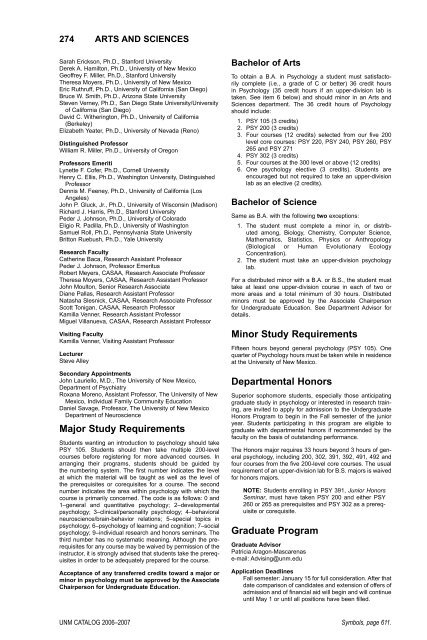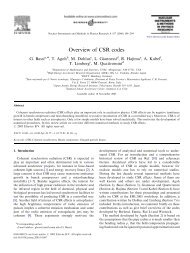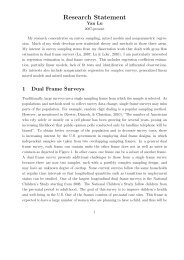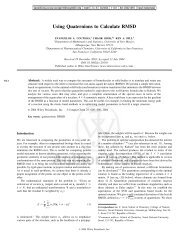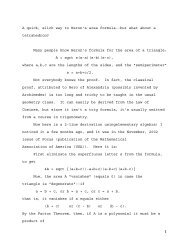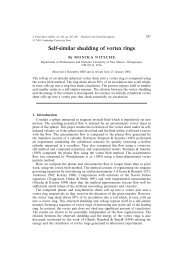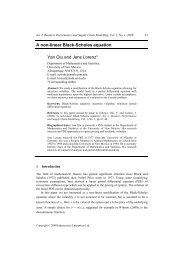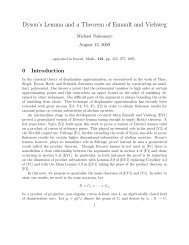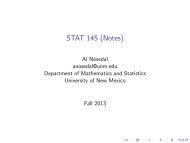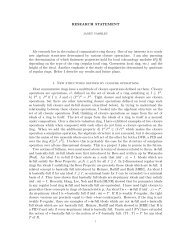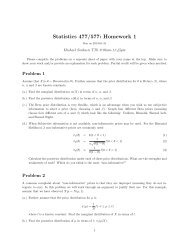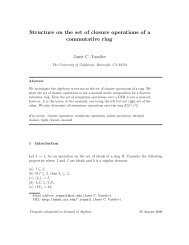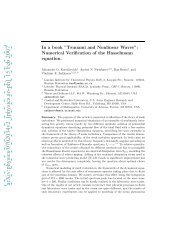OEO Office of Equal Opportunity - Department of Mathematics and ...
OEO Office of Equal Opportunity - Department of Mathematics and ...
OEO Office of Equal Opportunity - Department of Mathematics and ...
Create successful ePaper yourself
Turn your PDF publications into a flip-book with our unique Google optimized e-Paper software.
274 ARTS AND SCIENCES<br />
Sarah Erickson, Ph.D., Stanford University<br />
Derek A. Hamilton, Ph.D., University <strong>of</strong> New Mexico<br />
Ge<strong>of</strong>frey F. Miller, Ph.D., Stanford University<br />
Theresa Moyers, Ph.D., University <strong>of</strong> New Mexico<br />
Eric Ruthruff, Ph.D., University <strong>of</strong> California (San Diego)<br />
Bruce W. Smith, Ph.D., Arizona State University<br />
Steven Verney, Ph.D., San Diego State University/University<br />
<strong>of</strong> California (San Diego)<br />
David C. Witherington, Ph.D., University <strong>of</strong> California<br />
(Berkeley)<br />
Elizabeth Yeater, Ph.D., University <strong>of</strong> Nevada (Reno)<br />
Distinguished Pr<strong>of</strong>essor<br />
William R. Miller, Ph.D., University <strong>of</strong> Oregon<br />
Pr<strong>of</strong>essors Emeriti<br />
Lynette F. C<strong>of</strong>er, Ph.D., Cornell University<br />
Henry C. Ellis, Ph.D., Washington University, Distinguished<br />
Pr<strong>of</strong>essor<br />
Dennis M. Feeney, Ph.D., University <strong>of</strong> California (Los<br />
Angeles)<br />
John P. Gluck, Jr., Ph.D., University <strong>of</strong> Wisconsin (Madison)<br />
Richard J. Harris, Ph.D., Stanford University<br />
Peder J. Johnson, Ph.D., University <strong>of</strong> Colorado<br />
Eligio R. Padilla, Ph.D., University <strong>of</strong> Washington<br />
Samuel Roll, Ph.D., Pennsylvania State University<br />
Britton Ruebush, Ph.D., Yale University<br />
Research Faculty<br />
Catherine Baca, Research Assistant Pr<strong>of</strong>essor<br />
Peder J. Johnson, Pr<strong>of</strong>essor Emeritus<br />
Robert Meyers, CASAA, Research Associate Pr<strong>of</strong>essor<br />
Theresa Moyers, CASAA, Research Assistant Pr<strong>of</strong>essor<br />
John Moulton, Senior Research Associate<br />
Diane Pallas, Research Assistant Pr<strong>of</strong>essor<br />
Natasha Slesnick, CASAA, Research Associate Pr<strong>of</strong>essor<br />
Scott Tonigan, CASAA, Research Pr<strong>of</strong>essor<br />
Kamilla Venner, Research Assistant Pr<strong>of</strong>essor<br />
Miguel Villanueva, CASAA, Research Assistant Pr<strong>of</strong>essor<br />
Visiting Faculty<br />
Kamilla Venner, Visiting Assistant Pr<strong>of</strong>essor<br />
Lecturer<br />
Steve Alley<br />
Secondary Appointments<br />
John Lauriello, M.D., The University <strong>of</strong> New Mexico,<br />
<strong>Department</strong> <strong>of</strong> Psychiatry<br />
Roxana Moreno, Assistant Pr<strong>of</strong>essor, The University <strong>of</strong> New<br />
Mexico, Individual Family Community Education<br />
Daniel Savage, Pr<strong>of</strong>essor, The University <strong>of</strong> New Mexico<br />
<strong>Department</strong> <strong>of</strong> Neuroscience<br />
Major Study Requirements<br />
Students wanting an introduction to psychology should take<br />
PSY 105. Students should then take multiple 200-level<br />
courses before registering for more advanced courses. In<br />
arranging their programs, students should be guided by<br />
the numbering system. The first number indicates the level<br />
at which the material will be taught as well as the level <strong>of</strong><br />
the prerequisites or corequisites for a course. The second<br />
number indicates the area within psychology with which the<br />
course is primarily concerned. The code is as follows: 0 <strong>and</strong><br />
1–general <strong>and</strong> quantitative psychology; 2–developmental<br />
psychology; 3–clinical/personality psychology; 4–behavioral<br />
neuroscience/brain-behavior relations; 5–special topics in<br />
psychology; 6–psychology <strong>of</strong> learning <strong>and</strong> cognition; 7–social<br />
psychology; 9–individual research <strong>and</strong> honors seminars. The<br />
third number has no systematic meaning. Although the prerequisites<br />
for any course may be waived by permission <strong>of</strong> the<br />
instructor, it is strongly advised that students take the prerequisites<br />
in order to be adequately prepared for the course.<br />
Acceptance <strong>of</strong> any transferred credits toward a major or<br />
minor in psychology must be approved by the Associate<br />
Chairperson for Undergraduate Education.<br />
Bachelor <strong>of</strong> Arts<br />
To obtain a B.A. in Psychology a student must satisfactorily<br />
complete (i.e., a grade <strong>of</strong> C or better) 36 credit hours<br />
in Psychology (35 credit hours if an upper-division lab is<br />
taken. See item 6 below) <strong>and</strong> should minor in an Arts <strong>and</strong><br />
Sciences department. The 36 credit hours <strong>of</strong> Psychology<br />
should include:<br />
1. PSY 105 (3 credits)<br />
2. PSY 200 (3 credits)<br />
3. Four courses (12 credits) selected from our five 200<br />
level core courses: PSY 220, PSY 240, PSY 260, PSY<br />
265 <strong>and</strong> PSY 271<br />
4. PSY 302 (3 credits)<br />
5. Four courses at the 300 level or above (12 credits)<br />
6. One psychology elective (3 credits). Students are<br />
encouraged but not required to take an upper-division<br />
lab as an elective (2 credits).<br />
Bachelor <strong>of</strong> Science<br />
Same as B.A. with the following two exceptions:<br />
1. The student must complete a minor in, or distributed<br />
among, Biology, Chemistry, Computer Science,<br />
<strong>Mathematics</strong>, Statistics, Physics or Anthropology<br />
(Biological or Human Evolutionary Ecology<br />
Concentration).<br />
2. The student must take an upper-division psychology<br />
lab.<br />
For a distributed minor with a B.A. or B.S., the student must<br />
take at least one upper-division course in each <strong>of</strong> two or<br />
more areas <strong>and</strong> a total minimum <strong>of</strong> 30 hours. Distributed<br />
minors must be approved by the Associate Chairperson<br />
for Undergraduate Education. See <strong>Department</strong> Advisor for<br />
details.<br />
Minor Study Requirements<br />
Fifteen hours beyond general psychology (PSY 105). One<br />
quarter <strong>of</strong> Psychology hours must be taken while in residence<br />
at the University <strong>of</strong> New Mexico.<br />
<strong>Department</strong>al Honors<br />
Superior sophomore students, especially those anticipating<br />
graduate study in psychology or interested in research training,<br />
are invited to apply for admission to the Undergraduate<br />
Honors Program to begin in the Fall semester <strong>of</strong> the junior<br />
year. Students participating in this program are eligible to<br />
graduate with departmental honors if recommended by the<br />
faculty on the basis <strong>of</strong> outst<strong>and</strong>ing performance.<br />
The Honors major requires 33 hours beyond 3 hours <strong>of</strong> general<br />
psychology, including 200, 302, 391, 392, 491, 492 <strong>and</strong><br />
four courses from the five 200-level core courses. The usual<br />
requirement <strong>of</strong> an upper-division lab for B.S. majors is waived<br />
for honors majors.<br />
NOTE: Students enrolling in PSY 391, Junior Honors<br />
Seminar, must have taken PSY 200 <strong>and</strong> either PSY<br />
260 or 265 as prerequisites <strong>and</strong> PSY 302 as a prerequisite<br />
or corequisite.<br />
Graduate Program<br />
Graduate Advisor<br />
Patricia Aragon-Mascarenas<br />
e-mail: Advising@unm.edu<br />
Application Deadlines<br />
Fall semester: January 15 for full consideration. After that<br />
date comparison <strong>of</strong> c<strong>and</strong>idates <strong>and</strong> extension <strong>of</strong> <strong>of</strong>fers <strong>of</strong><br />
admission <strong>and</strong> <strong>of</strong> financial aid will begin <strong>and</strong> will continue<br />
until May 1 or until all positions have been filled.<br />
UNM CATALOG 2006–2007 Symbols, page 611.


